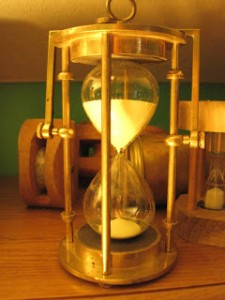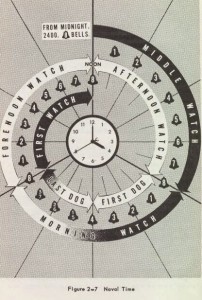The Watch
Wiliam Spavens
The ships company is generally divided into two equal parts, which are thus been denominated — the starboard watch and larboard watch…The duration of a watch at sea, is four hours, beginning at 8 o’clock at night, which is called the first watch; from 12 to 4, the middle watch; 4 to 8, the morning watch; from 8 to 12, the forenoon watch; from 12 to 4, the afternoon watch; and that from 4 to 8 is divided into two, called the dog watches; the design of which is to prevent one watch having two night watches every 24 hours. The trick at the helm is two hours, at the lead half an hour, and that the masthead the same… And in his majesty ships and vessels of war, the lieutenants (who take charge of watches) and the inferior officers are equally divided; but the captain, master, boatswain, other warrant officers sleep all night; and there are several who are excused from watching, to occupy their trades, such as the armor, butcher, barber, &c. who are called idlers, and are occasionally called up to assist the watch when it is not necessary to call hands; these are in charge of the Master at Arms and ship’s Corporal to turn up when they are called, which in squally weather is frequently three or four times in the watch. These are the common roles, on board all ships navigating in high latitudes, either for discovery or to fish for whales, &c. They make three watches, to prevent too great an exposure of the men to the intense cold, and to avoid the bad cop box of it, as they approach either of the poles, and in that case they termed the starboard, larboard and middle watch. When an anchor watch as Capt, it generally consists of only a petty officer and a few men to keep a lookout, and in blowing mother to stand by the sheet anchor to cut it away if necessary. The officers correct their timekeepers by the sun when he is in the meridian, and we then ring the bell and turn four-hour and half-hour glasses and hang them both up, and when the small one is out, we strike one on the bell; when it is out again, two; and so to seven; and when the large one is out we rang the bell, call and relieve the watch; but at 4 in the afternoon, only the little glasses turned, and that not for the last half hour; so when it is an 8:00 by the pocket watches, the bell is rung and both glasses turned for the first watch.
Watch-glasses, (horloge, Fr.) a name given to the glasses employed to measure the period of the watch, or to divide it into any number of equal parts, as hours, half-hours, &c. so that the several stations therein may be regularly kept and relieved; as at the helm, pump, look-out, &c. (Falconer 1468)

To set the watch is to appoint one division of the crew to enter upon the duty of the watch; as at eight o’clock in the evening. Hence it is equivalent to mounting the guard in the army.
Watch bill, a list of the officers and crew of a ship as divided into watches, with their stations.
Bibliography
Falconer, William
1790 Universal Dictionary of the Marine. T. Cadwell. London.
Spavens, William
1796 The Narrative of W. Spavens. Sheardown & Son. Louth.

